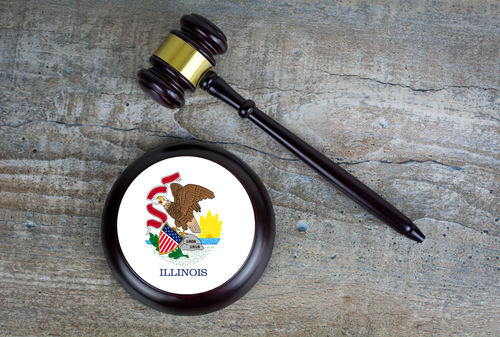Lawyer on hot mic who used obscenities to describe decision faces possible discipline

Image from Shutterstock.
An Illinois lawyer should receive a stayed suspension after she described a judge’s adverse ruling as “f- - -ing bulls- - -” while on a hot mic, according to a recommendation by ethics regulators.
The hearing board of the Illinois Attorney Registration and Disciplinary Commission recommended the sanction for Chicago-area lawyer Alison H. Motta in a March 29 report and recommendation.
The Legal Profession Blog has highlights.
The hearing board recommended a 90-day suspension, stayed by a one-year period of probation, for Motta.
Motta, who was a member of Motta & Motta in Aurora, Illinois, was accused of repeatedly muttering under her breath and visibly reacting after a federal judge overruled her objections during a January 2017 criminal trial in Chicago. The judge heard Motta’s “f- - -ing bulls- - -” comment when it was picked up on the courtroom audio.
Motta made the comment, even though the judge had warned Motta to stop the unprofessional conduct on several occasions.
Motta also took photos during the prosecutor’s closing argument, despite a sign banning photos.
Motta told the hearing board she didn’t think her F-word comment would be picked up by the microphone. She intended only her co-counsel and intern to hear it.
She said she took photos during the closing argument because prosecutors had broken down a video into still frames that were identified by a series of numbers. Prosecutors then described what each frame supposedly showed. Motta said she took a photo because she did not think the defense team had time to write down all the numbers and she wanted to use the same images in her closing.
Motta’s conduct in the federal case in Chicago led to her suspension from practice in federal court there for 90 days.
Motta was also accused of misconduct for pretrial statements that she made about two Nebraska homicide prosecutions in March 2016. Motta had been admitted pro hac vice in Nebraska to represent the homicide suspect, who was arrested in Illinois.
Motta told local news media in Nebraska that DNA evidence in the case against her client matched the DNA for a different suspect in a different murder. She said the evidence “conclusively exonerates” her client, and she hoped that the charges would be dropped.
Nebraska ethics rules bar lawyers from making extrajudicial statements that have a material likelihood of prejudicing a court proceeding. She was reprimanded in Nebraska for the conduct.
Motta testified that the county attorney had granted a media interview discussing the evidence against her client, and she thought that she could respond to the prosecution contentions. She agrees, however, that she overstepped the bounds of what she was permitted to say.
The Illinois hearing board concluded that there were “extensive mitigating and minimal aggravating factors” in the ethics case.
Motta understands that her conduct was wrong and accepts responsibility for her actions, the hearing board said. She has no prior misconduct. Character witnesses testified to her good reputation.
Motta had testified that her passion is criminal law, and she is driven to take cases involving injustice, the underprivileged and minorities. She often discounts her fees or takes nominal payments if she sees injustice or thinks that people have been targeted because of their race. She also represents people losing their homes on a pro bono basis.
She also works with a charitable organization that she founded called the Jacktivists.
“She explained that her passion outside of law is live music and especially the band My Morning Jacket, which has a tightknit fan base with more affluent people,” the hearing board said. “She helped found the Jacktivists to use the fans’ collective resources to raise money for charities; carry out projects, such as a school supply drive; and promote petition drives for causes, such as voting, gun safety and the environment.”
Motta did not immediately respond to the ABA Journal’s request for comment, left with a law firm answering service and sent to her firm’s email address.
Updated April 14 at 10:30 a.m. to add that Alison H. Motta didn’t respond to a request for comment.



